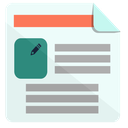5 super-useful books on time management
Time is a very expensive resource. Do we have to take the article, prepare the project for deadline or even just effectively combine personal and work assignments – all this lies in the plane of our ability to manage time. We have collected several good books on time management that will be useful to all of us.

- Getting things done. The Art of stress-free Productivity, David Allen
The revised edition is perhaps the most famous book in the world on time management and personal effectiveness, first published in 2001 and translated into 30 languages. David Allen, who worked on the book for 20 years, introduced the Getting Things Done system, which today has millions of fans around the world.
The book consists of three parts. In the first part, David Allen talks about why time is always lacking, what habits are hindering you, about how important it is to make lists of tasks. In the second part – the practice and recommendations for planning. What is this process, what may be needed for planning? The third part will teach you to compile lists of tasks and plan your time.
Take the Getting Things Done system into the arsenal and learn to correctly prioritize, separate the important from the secondary. As a result, you will find that the time, which was still so little yesterday, is actually enough for work and rest.
- Hard time management. Take your life under control, Dan Kennedy
This book unfairly falls into the selection of the best books on time management. The main idea of the book is that you need to free your life from the devourers of time. Honestly, after reading the book, we were even surprised, there are so many of them.
Of course, a number of measures proposed by the author are rather radical, but they sing it out from most books on time management.
- Get out of the comfort zone. 21 methods of increasing personal effectiveness, Brian Tracy
Leaving your comfort zone is probably the most difficult for any person. Brian Tracy studied the issues of time allocation for 30 years and believes that nothing is impossible here. Moreover – only a way out of this very zone will allow to effectively solve complex problems and not spend too much time on them.
The book used to come out under the name “Eat a frog! 21 ways to learn to manage.” So if you’ve already read a book with that name, then a new edition is what it is. What does the frog have to do with it? Tracy cites Mark Twain, who once said that if in the morning the first thing to eat a frog, the rest of the day will be wonderful. In the sense that if you do all the unpleasant things in the morning, then the rest of the day you will not suffer, thinking about them, and generally free up your time for pleasant things.
“Do not you physically have time to do everything you need? And do not expect to have time. You have overwhelmed yourself with your head, because you do not distinguish between essential and secondary affairs, worse – delay to undertake precisely for what is of fundamental importance. Every time you stop the first step: learn to overcome yourself – and life will change. ”
- I have no time! In search of free time in the era of universal time pressure, Brigid Schulte
If you have no time for anything, and yet you are a woman, this book is just a must read. Brigid teaches us to find time for ourselves and our hobbies in an endless succession of cases.
The book is the result of a journalistic investigation conducted by Schulte, having met with many people from different generations and talking to them about how they cope with permanent employment.
Men, of course, can frighten the book with a slightly feminist approach, but this is completely in vain – good advice, suitable for both women and men.

- Maximum concentration. How to maintain efficiency in the era of clip-making, Lucy Jo Palladino
This book is not really about time management, but we still decided to include it in our collection. Time management and the ability to concentrate on the implementation of specific cases are very closely related.
Psychologist Lucy Jo Palladino says that our ability to concentrate largely depends on the level of adrenaline in our body. Good news: this can be consciously managed.
Palladino tells how to learn to focus on one task without being distracted by unnecessary, and thus perform work faster, leaving time to rest. A very useful skill for all of us, given the life rhythm we live in.
